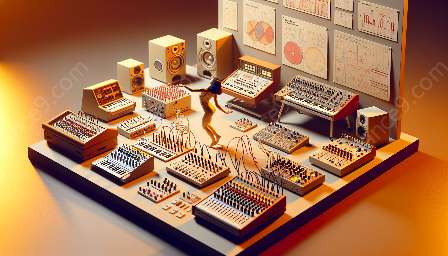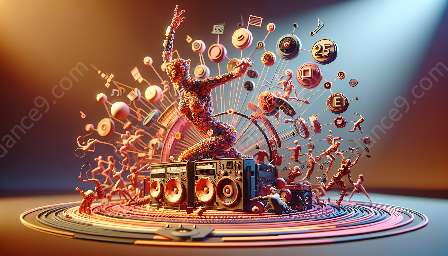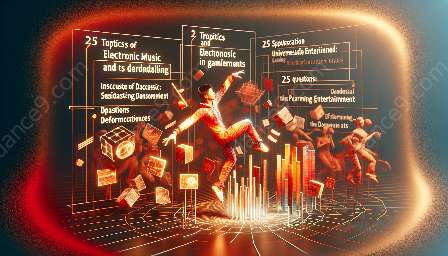Performance art is a dynamic and multifaceted form of expression that encompasses various mediums, including dance and electronic music. This article delves into the ethical considerations inherent in performance art, particularly in the context of dance and electronic music theory. By examining the intersection of ethics and creativity, we aim to shed light on how ethical principles influence artistic practices and audience experiences.
The Essence of Performance Art
Performance art transcends traditional boundaries, offering a platform for artists to convey complex emotions, narratives, and ideas through movement and sound. Within this context, dance and electronic music contribute to the rich tapestry of performance art, enabling artists to communicate with audiences on profound levels. However, the ethical dimension of performance art plays a pivotal role in shaping the nature and impact of these artistic endeavors.
Ethical Considerations in Dance
When exploring performance art in the realm of dance, ethical considerations encompass a wide range of parameters, such as cultural sensitivity, consent, and representation. Choreographers and performers must navigate the delicate balance between artistic expression and the preservation of human dignity. Issues of appropriation, stereotyping, and exploitation can arise, prompting artists to critically evaluate their creative decisions and their potential impact on diverse audiences.
Cultural Sensitivity
Respecting cultural traditions and norms is paramount in the realm of dance. Whether drawing inspiration from traditional dances or fusing multiple cultural elements, artists must approach their work with cultural sensitivity and awareness. Ethical choreography involves engaging with cultural consultants, seeking informed consent, and acknowledging the provenance of movements and styles within the context of globalization.
Consent and Respect
Consent lies at the heart of ethical dance performances. Choreographers and dancers should prioritize the comfort and agency of performers, ensuring that all participants willingly engage in the artistic process. Moreover, respectful representation of diverse identities, body types, and experiences underscores the ethical responsibility of artists in shaping inclusive and empowering narratives through dance.
Ethical Considerations in Electronic Music
Electronic music theory intertwines with performance art through live electronic performances, DJ sets, and multimedia collaborations. As technology continues to redefine the boundaries of musical expression, ethical considerations in electronic music encompass issues such as digital rights, artistic integrity, and audience experience. The ethical implications of music creation, distribution, and consumption reflect the evolving landscape of the electronic music industry.
Digital Rights and Fair Use
The digital realm presents unique ethical challenges for electronic music creators and performers. Issues related to copyright infringement, fair use, and digital sampling require careful navigation to uphold the rights of original artists and creators. Additionally, ethical considerations surrounding digital distribution platforms and streaming services contribute to the ethical landscape of electronic music creation and dissemination.
Artistic Integrity and Authenticity
Artists in the electronic music scene face the ethical imperative of maintaining artistic integrity amid commercial pressures and trends. Balancing creative autonomy with industry demands, artists grapple with questions of authenticity, artistic evolution, and the impact of their work on listeners. Ethical electronic music production and performance revolve around transparency, creativity, and a commitment to delivering genuine artistic experiences.
The Interplay of Ethics and Artistic Expression
While ethical considerations impose constraints on artistic expression, they also serve as catalysts for innovation, empathy, and social change. Ethical performance art, rooted in dance and electronic music, has the potential to offer transformative experiences that resonate with audiences on emotional, intellectual, and ethical levels. By embracing ethical frameworks, artists can elevate their creative endeavors and foster meaningful connections with diverse communities.
Impact on Audience Experience
Endowing performance art with ethical depth enhances the audience experience, fostering a sense of ethical engagement and emotional resonance. When dance and electronic music are imbued with ethical sensitivity and conscientious storytelling, audiences are invited to reflect on societal issues, personal struggles, and universal themes. Ethical performance art thus becomes a conduit for dialogue, empathy, and introspection, transcending entertainment to provoke meaningful discourse and reflection.
Conclusion
In conclusion, ethical considerations in performance art, particularly within the realms of dance and electronic music, hold a profound influence on artistic creation, interpretation, and reception. By recognizing the ethical responsibilities inherent in performance art, artists and audiences alike can cultivate a culture of respect, understanding, and empathy. With a commitment to thoughtfully navigating the ethical complexities of performance art, dancers, musicians, and creators can harness their creative potential to inspire, challenge, and uplift individuals and communities around the world.






























